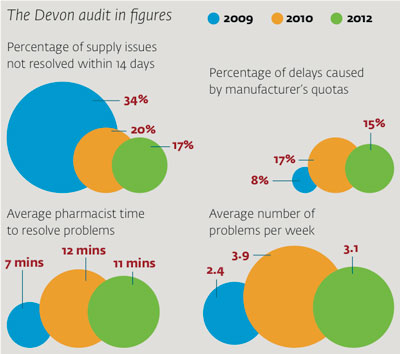Patients 'frightened' as stock shortage chaos continues
Exclusive Almost a quarter of medicines supply delays experienced by pharmacies are leading to patient harm, more than double the estimated rates in 2009, an audit by Devon LPC has suggested.
Almost a quarter of medicines supply delays experienced by pharmacies are leading to patient harm, more than double the estimated rates in 2009, an audit by Devon LPC has suggested.
Across 66 pharmacies in the region, 415 stock shortages were experienced during a two-week auditing period this year – an average of more than three problems a week in every pharmacy. This was up from a previous audit in 2009, when Devon pharmacies had to deal with an average 2.4 incidents per week, but down from 2010 when the figure was 3.9 incidents a week.
The latest audit saw pharmacies in the area recording the outcome of stock shortages they encountered over a two-week period earlier this year and pharmacists rating incidents of harm based on National Patient Safety Agency definitions.
|
In 94 incidents during Devon LPC's auditing period, patients had suffered "low" or "moderate" harm |

|
|
It found that in 94 incidents during the auditing period, patients had suffered "low" or "moderate" harm. Some patients completed self-assessment forms, with one glaucoma patient reporting fears of blindness due to the medicine shortages, and another saying they were "very, very frightened". The testimonials came despite delays being resolved within an average of two days this year – down from 4.4 days in 2010 – although 17 per cent were not resolved within the 14-day audit period. |
Mark Stone, a project pharmacist on Devon LPC, said the reduced average waiting time was down to pharmacists becoming "much more effective" at sourcing stock and "working the system".

Mr Stone also highlighted that pharmacists were spending more time resolving shortage issues – up from seven minutes per incident in 2009 to 11 minutes this year. And there was a three-fold increase in pharmacists contacting prescribers to resolve problems.
Manufacturing problems were increasingly seen as the cause of the shortages, and quotas held responsible for almost twice as many delays as three years ago, with "general out of stock" less likely to be quoted as the cause.
But while PSNC chief executive Sue Sharpe called on the Department of Health (DH) to regulate manufacturers to ensure their compliance with best practice guidance on 24-hour supply "if necessary", the Association of British Pharmaceutical Industry (ABPI) said its members were "working hard" to speed up medicines delivery.
"We know quotas are not the perfect answer – they are a plaster, not a cure," admitted ABPI chief executive Stephen Whitehead. "That does not change the fact that without quotas, figures relating to patient harm would be much worse."
Labour MP Huw Irranca-Davies called for health secretary Andrew Lansley to take "personal and immediate responsibility" for resolving the supply chain problems, stressing that the Devon LPC findings should be a "wake-up call for action".
Expert comment: News editor Zoe Smeaton
Stock shortages explained – what the Devon data does
 So what does the Devon data tell us? Mostly, it's what we already knew, or could have guessed – pharmacists are continuing to spend an unacceptable amount of time sourcing medicines and patients are being affected.
So what does the Devon data tell us? Mostly, it's what we already knew, or could have guessed – pharmacists are continuing to spend an unacceptable amount of time sourcing medicines and patients are being affected.
What is new is the quality of the data. Most other stock surveys rely on pharmacists' memories or judgement of the problem – the C+D Stocks Survey, for example, asked whether stock shortages were getting worse, but this relied on pharmacists' impressions of the problem.
The Devon audit doesn't rely so heavily on such opinions because pharmacists are recording the problem in real-time – so on questions like how many shortages pharmacists are encountering, it gives us figures that we can rely on as based on actual experiences.
The question then becomes how much of a difference the data will make. It would be nice to think that a quantitative study like this would convince the DH that stock shortages really do need tackling and, as MP Huw Irranca-Davies suggests, to kick it into more decisive action – like enforcing best practice guidance.
Unfortunately, experience tells us this is unlikely. The all-party pharmacy group concluded only last month that there was already evidence of a serious problem. Yet the most ministers have committed to is looking into carrying out their own assessment of the situation. And this seems the most likely step – a DH-led contractors survey to find out more.
For the pharmacists who have been dealing with shortages for years, it almost certainly feels like too little, too late. And given the DH's track-record on this, it would be reasonable to ask just how much longer a survey could stall decisive action from the department. But it is at least a step forward. And while we wait for more progress, all community pharmacy can do is keep coming up with evidence, as the Devon audit has done so well, and hope that keeping up the pressure will make those steps come a little more quickly in future.

|
Are manufacturing problems more of an issue than quotas? Comment below or email us at [email protected] You can also find C+D on Twitter, LinkedIn and Facebook |


 ABPI welcomes MHRA ban on unlicensed stock
trading
ABPI welcomes MHRA ban on unlicensed stock
trading

